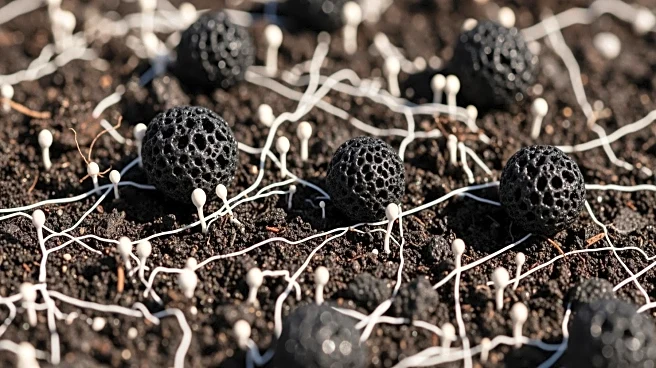What's Happening?
Recent research has highlighted the role of arbuscular mycorrhizal fungi (AMF) and biochar in enhancing soil carbon stabilization. Soils are the largest terrestrial reservoir of organic carbon, and their ability to sequester carbon is crucial for regulating
atmospheric CO2 levels and mitigating climate change. AMF contribute to soil carbon cycling by enhancing plant growth, stress tolerance, and necromass production. They facilitate the transfer of plant-derived carbon into stable soil carbon pools through processes such as aggregation and mineral association. Biochar, with its porous structure, provides a stable habitat for microbial and fungal communities, further aiding in carbon retention. The study proposes that AMF and biochar together can promote the formation of stable soil carbon phases, contributing to long-term carbon storage.
Why It's Important?
The stabilization of soil carbon is vital for climate change mitigation, as it helps reduce atmospheric CO2 levels. The use of AMF and biochar represents a promising strategy for enhancing soil carbon sequestration, which could have significant implications for agricultural practices and environmental policies. By improving soil health and carbon retention, these methods can lead to more sustainable farming practices and contribute to global efforts to combat climate change. The research underscores the importance of understanding and harnessing biological and physicochemical processes in soil management, potentially influencing future agricultural and environmental strategies.
What's Next?
Further research is needed to explore the mechanisms by which AMF and biochar enhance soil carbon stabilization. This includes investigating the interactions between fungal networks and biochar surfaces, and how these contribute to carbon retention. The findings could lead to the development of new soil amendments and agricultural practices that prioritize carbon sequestration. Policymakers and agricultural stakeholders may consider integrating these strategies into climate action plans and sustainable farming initiatives.
Beyond the Headlines
The study highlights the potential for biological processes to play a significant role in climate change mitigation. By focusing on soil carbon stabilization, researchers are exploring innovative ways to address environmental challenges. The integration of AMF and biochar into soil management practices could lead to long-term shifts in agricultural and environmental policies, emphasizing the importance of sustainable resource use and ecosystem health.
















